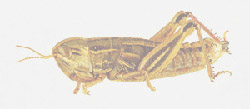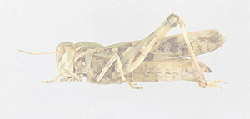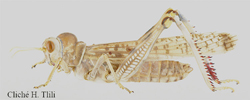
Pamphagidae : 17 genera
This family includes species of very variable shape and size, but constitutes a monophyletic group (Zhang et al., 2011). They are characterised by : an ever-present fastigial furrow, lower basal lobe of hind femora longer than the upper one, a head never acutely conical and a prosternal process present. The Krauss’s organ on the second abdominal tergite is involved in the mechanism of stridulation in winged individuals. Tegmina are usually reduced to scale-like lobes rarely fully developed. Body integument is rugose or tuberculate. Pamphagus elephas (photo) is the largest Pamphagide of North West Africa.






